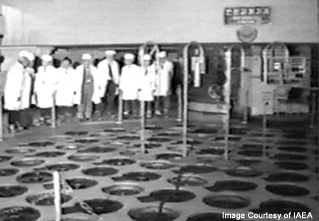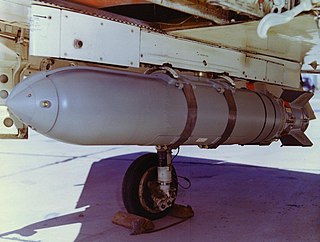
United Nations Security Council Resolution 687 was adopted on 3 April 1991. After reaffirming resolutions 660, 661, 662, 664, 665, 666, 667, 669, 670, 674, 677, 678 and 686 (1991), the Council set the terms, in a comprehensive resolution, with which Iraq was to comply after losing the Gulf War. Resolution 687 was passed by 12 votes to one (Cuba) against, with two abstentions from Ecuador and Yemen, after a very extended meeting. Iraq accepted the provisions of the resolution on 6 April 1991.

United Nations Security Council Resolution 1718 was adopted unanimously by the United Nations Security Council on October 14, 2006. The resolution, passed under Chapter VII, Article 41, of the UN Charter, imposes a series of economic and commercial sanctions on the Democratic People's Republic of Korea in the aftermath of that nation's claimed nuclear test of October 9, 2006.

United Nations Security Council resolution 1540 was adopted unanimously on 28 April 2004 regarding the non-proliferation of weapons of mass destruction. The resolution establishes the obligations under Chapter VII of the United Nations Charter for all member states to develop and enforce appropriate legal and regulatory measures against the proliferation of chemical, biological, radiological, and nuclear weapons and their means of delivery, in particular, to prevent the spread of weapons of mass destruction to non-state actors.

United Nations Security Council Resolution 1916, adopted unanimously on March 19, 2010, after recalling resolutions 733 (1992), 1519 (2003), 1558 (2004), 1587 (2004), 1630 (2005), 1676 (2006), 1724 (2006), 1744 (2007), 1766 (2007), 1772 (2007), 1801 (2008), 1811 (2008), 1844 (2008), 1853 (2008), 1862 (2009), 1894 (2009) and 1907 (2009), the Council extended the term of the Monitoring Group for 12 months and expanded its mandate to include the monitoring of the arms embargo on Eritrea in addition to Somalia.

United Nations Security Council Resolution 1928, adopted unanimously on June 7, 2010, after recalling resolutions 825 (1993), 1540 (2004), 1695 (2006), 1718 (2006), 1874 (2009) and 1887 (2009) on the topics of North Korea and nuclear weapons, the Council extended the mandate of a panel of experts monitoring sanctions against the country until June 12, 2011.

United Nations Security Council Resolution 1929, adopted on 9 June 2010, after recalling resolutions 1696 (2006), 1737 (2006), 1747 (2007), 1803 (2008), 1835 (2008) and 1887 (2009) concerning the topics of Iran and non-proliferation, the Council noted that Iran had failed to comply with previous Security Council resolutions concerning its nuclear program and imposed further sanctions on the country.

United Nations Security Council Resolution 1977, adopted unanimously on April 20, 2011, after recalling resolutions 1540 (2004), 1673 (2006) and 1810 (2008) concerning non-proliferation —to monitor efforts to prevent weapons of mass destruction from being acquired by terrorists or other non-state actors.

United Nations Security Council Resolution 1984, adopted on June 9, 2011, after recalling resolutions 1696 (2006), 1737 (2006), 1747 (2007), 1803 (2008), 1835 (2008), 1887 (2009) and 1929 (2010) concerning Iran and non-proliferation, the Council extended the mandate of an expert panel monitoring sanctions against the country over its nuclear program for a period of one year.

United Nations Security Council Resolution 1985, adopted unanimously on June 10, 2011, after recalling resolutions 825 (1993), 1540 (2004), 1695 (2006), 1718 (2006), 1874 (2009), 1887 (2009), 1928 (2010) on the topics of North Korea and nuclear weapons, the Council extended the mandate of an expert panel monitoring sanctions against the country until June 12, 2012.

United Nations Security Council Resolution 1673, adopted unanimously on April 27, 2006, after considering a report from the Committee of the Security Council established in Resolution 1540 (2004) concerning non-proliferation, the Council extended the mandate of the Committee monitoring the resolution's implementation concerning weapons of mass destruction and their means of delivery until April 27, 2008.
United Nations Security Council Resolution 1762 was adopted on 29 June 2007.
United Nations Security Council Resolution 1868 was unanimously adopted on 23 March 2009.
United Nations Security Council Resolution 1807 was unanimously adopted on 31 March 2008.
The G7-led Global Partnership Against the Spread of Weapons and Materials of Mass Destruction is an international security initiative announced at the 2002 G8 summit in Kananaskis, Canada, in response to the September 11 attacks. It is the primary multilateral group that coordinates funding and in-kind support to help vulnerable countries around the world combat the spread of weapons and materials of mass destruction (WMDs).
Project Alpha is an academic research project working to counter nuclear proliferation-related trade. It was founded in 2011 with funding from the British Government and is housed in the Centre for Science and Security Studies at King's College London. Its primary mission is to publish independent research findings on illicit trade activities and to support the private and the public sectors with the implementation of international trade controls in order to deter the proliferation of nuclear weapons.
The United Nations Security Council adopted United Nations Security Council resolution 2235 (2015) on 7 August 2015, in response to use of chemical weapons in the Syrian Civil War. The resolution condemned "any use of any toxic chemical, such as chlorine, as a weapon in the Syrian Arab Republic" and expressed determination to identify and hold accountable those responsible for such acts. The resolution established a Joint Investigative Mechanism (JIM), a partnership between the United Nations (UN) and the Organisation for the Prohibition of Chemical Weapons (OPCW). The Security Council renewed the JIM's mandate in resolution 2319 (2016) on 17 November 2016, for a further period of one year.
A number of country and international bodies have imposed international sanctions against North Korea. Currently, many sanctions are concerned with North Korea's nuclear weapons programme and were imposed after its first nuclear test in 2006. North korea was most sanctioned country in the world before russian invasion of ukraine, north Korea was most sanctioned country some times in 2006, faced near 4,385 sanctions, in many times north Korea faced 3,600 sanctions from us, eu, un, various countries.

The UN Security Council Sanctions Committee on North Korea is a subsidiary body established in 2006 by the UN Security Council's resolution 1718 in response to North Korea's first nuclear test and its other nuclear proliferation efforts.










